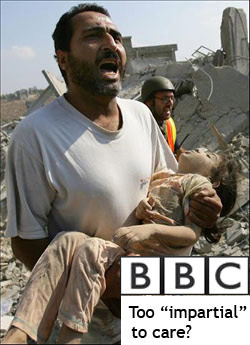The BBC are making an ugly and crass mistake that will (incidentally) cause innocent people to die
27 Jan 2009 Why can the BBC not broadcast an appeal by the Disasters Emergency Committee about Gaza?
Why can the BBC not broadcast an appeal by the Disasters Emergency Committee about Gaza?
The Disasters Emergency Committee (DEC) concerns are humanitarian, not political. They are a committee made up of representatives from the world’s aid agencies, including Oxfam, the Red Cross, Cafod, Christian Aid, Help the Aged, Save the Children and so on. Their job is to provide humanitarian assistance wherever it is needed, aside from any political considerations.
So why is the BBC – and now Sky – standing in their way?
Political reasons. What else can it be? The BBC claim here that this appeal is somehow different because there is uncertainty as to “WHO CAUSED” the suffering of the (almost entirely Palestinian) civilians. But surely the humanitarian imperative is to answer “who cares? These people need help. That is the only consideration. And then we can ask “how is this crisis different from any other crisis caused by politics or conflict?”. So there is a clear case of double standards because the BBC was happy to broadcast DEC appeals in these “politicised” cases:
2009 Congo (DR) Crisis Appeal
due to political crisis and conflict
ongoing. Amount raised to date: 9.7 million
2007-8 DARFUR & CHAD APPEAL
Over two million people displaced due to ongoing conflict and violence in Darfur.
Launched: 24 May 2007
Amount raised: £13.6 million
2004 SUDAN EMERGENCY APPEAL
Over two million people displaced doing to ongoing conflict and violence in Darfur.
Launched: 20 July
Amount raised to date: £35 million
2003 LIBERIA CRISIS APPEAL
Civil war in Liberia left over one million people trapped in appalling conditions of poverty.
Launched: 12 August
Amount raised: £2.5 million
(Information from the DEC website here)
This is a frankly scary change of mood from the BBC. Their explanation is so poor that it immediately strikes fear into me that there is whole-scale political manipulation going on, and a misdirection in terms of their stated reasons. Their explanation also manages to be distasteful: the phrase where they worry about compromising their perceived impartiality “in the context of covering a continuing news story” is especially weird. Are they saying that until the “news story” has finished, they shouldn’t help any of the people who are dying? Besides the conflict has officially finished. What are they waiting for? For blame somehow by someone to be ascertained? When will that come if the answer isn’t obvious already? (1,300 Palestinians killed and 13 Isralis. Yes, that’s a factor of not ten to one, but ONE HUNDRED TO ONE. And only 3 of those Israelis were actually civilians killed by Hammas rocket-fire, the other 10 were soldiers, themselves involved in killing). The BBC has already of course been separately accused of biased coverage. If the BBC were trying to prove a bias, with-holding aid funds from Palestinian civilian casualties would seem a good way to do it…
This incident continues what is perhaps a new trend at the BBC; they did it with Climate Relief, a Comic-Relief-type event designed to raise money for victims of climate change. Senior news editors weighed-in and convinced the BBC Trust and management not to proceed because it, again, “compromised impartiality”.
Presumably Director-General Mark Thompson is ultimately responsible for this, and perhaps it comes from giving too close an ear to “editors” in areas of the BBC’s obligations that shouldn’t even concern them: again, in the Gaza case, Mark Thompson explains the decision has been taken “in particular after seeking advice from senior leaders in BBC Journalism”. But so what? Why were they even consulted? It’s not about the BBC’s editorial control. DEC appeals are broadcast because they serve humanitarian ends; they’re not supposed to be editorially-controlled, they’re supposed to be broadcast because the BBC has a clear public-service commitment, not to mention the humanitarian imperative.
Thompson’s actions show a willingness to micro-manage every aspect of the BBC’s output, when that’s neither necessary nor desirable: everybody understands that Emergency Appeals aren’t “programmed” by the BBC for artistic reasons, but Thompson obviously wants the BBC’s narrative to be only what he says it should be – and that is where the politicisation lies, in Thompson’s BBC deliberately avoiding its public-service commitments.
To my mind this shows a new, crass, brutalist and right-wing tendency at the BBC, maintaining a veneer of pseudo-impartiality in the face of independent humanitarian issues where general consensus is obvious.
We should lobby for the BBC to change its mind (including through their complaints procedure, and in Thompson’s case particularly I feel we should be watching his leadership closely: one more strike, I suggest, and he should be out.
 Email This Post
Email This Post
27 Jan 2009 Matt Wootton
I don’t believe we should wait for one more “strike” – the man should be sacked now. Great post.
Also, here’s my take on it:
http://rayyanmirza.wordpress.com/2009/01/27/bbc-shame-on-you-not-strong-enough-bbc-how-dare-you/
Nice work, Matt.
Yes, Thompson should consider his position.
I will be hitting East of England Beeb on this, very soon, btw…
Let’s all do the same!